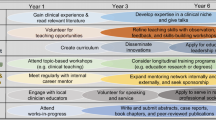Abstract
In the last 20 years, the clinician educator has become an integral, indispensable part of the academic team. Competition for clinical revenue and increased rigor of mandating physician competency and evidenced-based treatments have created a niche in academia in which the clinician educator can thrive. Academic clinician educators are needed in adult and pediatric rheumatology. A two-tiered system for promotion exists: research and publication are still rewarded faster and acknowledged more than teaching and excellence in clinical care. Clinician educators must be better prepared for teaching, stimulated to create new curricula and methods of evaluation, and provided opportunities to publish their work. Faculty development programs and advanced degrees in education are essential, and promotion criteria must be modified. Clinician educators have a place in academia, but they must continue to thrive as master clinicians, innovators in competency-based teaching methods and evaluation, and contributors to the literature.
Similar content being viewed by others
References and Recommended Reading
Branch WT, Kroenke K, Levinson W: The clinician-educator—present and future roles. J Gen Intern Med 1997, 12(Suppl 2):S1–4.
Fleming VM, Schindler N, Martin GJ, DaRosa DA: Separate and equitable promotion tracks for clinician-educators. JAMA 2005, 294:1101–1104. This is an excellent commentary describing the history of clinician educator tracks, recommendations for promotion, and documentation systems.
Boyer E: Scholarship Reconsidered: Priorities of the Professoriate. San Francisco: Carnegie Foundation for the Advancement of Teaching; 1990:1–25.
Atasoylu AA, Wright SM, Beasley BW, et al.: Promotion criteria for clinician-educators. J Gen Intern Med 2003, 18:711–716. An article reporting the results of a questionnaire to Department of Medicine chairpersons to identify the promotion criteria for clinician educators. Also compares the results to a previous study of promotion and tenure committee criteria.
Accreditation Council for Graduate Medical Education (ACGME): ACGME Outcome Project. http://www.acgme.org/ outcome/comp/compFullflasp. Accessed September 15, 2006.
U.S. Institute of Medicine Committee on Quality of Health Care in America, NetLibrary Inc.: Crossing the Quality Chasm—A New Health System for the 21st Century. Washington, DC: National Academy Press; 2001.
American Board of Internal Medicine: Internal Medicine Fellowship Programs. http://www.abim.org/resources/trainfellow. shtm. Accessed September 15, 2006.
American Board of Pediatrics: Subspecialty Training Requirements. http://www.abp.org/resident/trchanges.htm. Accessed September 15, 2006.
Mayer M, Brogan L, Sandborg CI: Availability of pediatric rheumatology training in U.S. pediatric residencies. Arthritis Care Res 2006, in press.
Beasley BW, Wright SM, Cofrancesco J Jr, et al.: Promotion criteria for clinician-educators in the United States and Canada. A survey of promotion committee chairpersons. JAMA 1997, 278:723–728.
Thomas PA, Diener-West M, Canto MI, et al.: Results of an academic promotion and career path survey of faculty at the Johns Hopkins University School of Medicine. Acad Med 2004, 79:258–264.
Levinson W, Rubenstein A: Mission critical—integrating clinician-educators into academic medical centers. N Engl J Med 1999, 341:840–843.
Levinson W, Rubenstein A: Integrating clinician-educators into Academic Medical Centers: challenges and potential solutions. Acad Med 2000, 75:906–912.
McLaughlin SA: Faculty development. Acad Emerg Med 2005, 12:302e1–5. An excellent overview of faculty development programs and ways to improve education skills of faculty, develop educators’ portfolios, and give better presentations.
Houston TK, Clark JM, Levine RB, et al.: Outcomes of a national faculty development program in teaching skills: prospective follow-up of 110 medicine faculty development teams. J Gen Intern Med 2004, 19:1220–1227.
American Association of Medical Colleges: Medical School Based Career and Leadership Development Programs. http://www.aamc.org/members/facultydev/facultyvitae/ spring06/programs.pdf. Accessed September 15, 2006.
Cole KA, Barker LR, Kolodner K, et al.: Faculty development in teaching skills: an intensive longitudinal model. Acad Med 2004, 79:469–480.
Viggiano TR, Shub C, Giere RW: The Mayo Clinic’s Clinician-Educator Award: A program to encourage educational innovation and scholarship. Acad Med 2000, 75:940–943.
Harvard Macy Institute. http://www.harvardmacy.org. Accessed September 15, 2006.
Cohen R, Murnaghan L, Collins J, Pratt D: An update on master’s degrees in medical education. Med Teach 2005, 27:686–692. An overview of available master’s degrees in medical education and contact information with more specifications of the programs.
Lewis KO, Baker RC: Development and implementation of an online master’s degree in education program for health care professionals. Acad Med 2005, 80:141–146.
Author information
Authors and Affiliations
Corresponding author
Rights and permissions
About this article
Cite this article
Passo, M.H. The role of the clinician educator in rheumatology. Curr Rheumatol Rep 8, 469–473 (2006). https://doi.org/10.1007/s11926-006-0043-1
Issue Date:
DOI: https://doi.org/10.1007/s11926-006-0043-1




